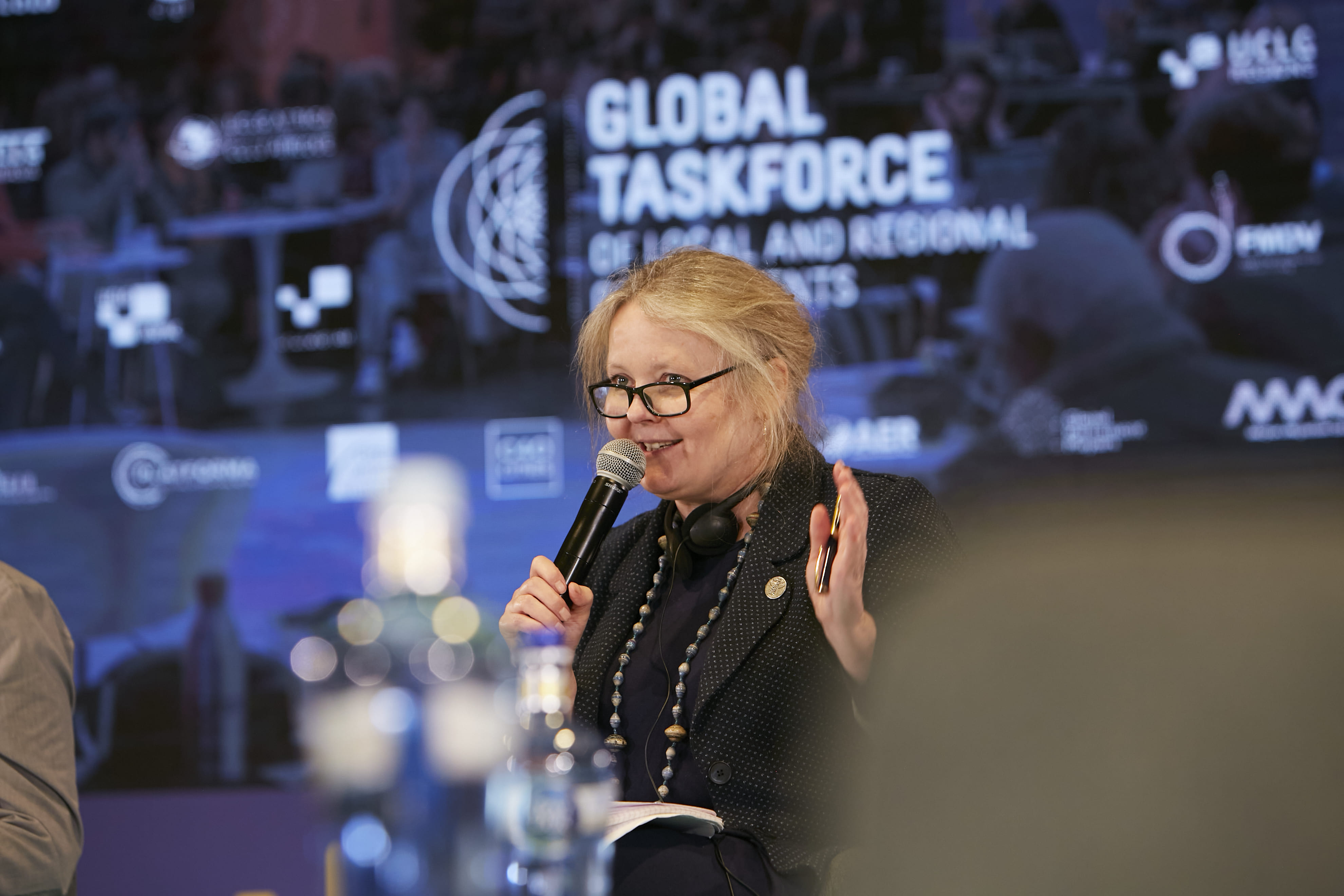The imperative to accelerate the implementation of policies and actions to enhance equality, acknowledge care and its importance, and become more inclusive and adaptive has never been more pressing.
Greg Munro, Director of Cities Alliance, highlighted that while the world is rapidly urbanising, the situation with poverty, primary access to sanitation and safe drinking water should improve, as data show that progress has stopped. For him, the reasons for this fallback are “the mismanagement of public funds at the local level” and “bad political commitment,” To address this scenario, he encouraged leaders to translate the UCLG Pact for the Future into tangible policies and actions.
Ana Moreno, Technical Secretary of the Global Alliance for Care, also highlighted the need to transform the existing recognition of care into “policies, budgets and national regulations.” She stressed that “care is undervalued and unrecognised, but care is central to life” and needs to be included in a transversal way in global and local agendas.
Another critical topic raised at the session was food security, sovereignty, and the sustainability of our food systems. Saul Morris, representing the Urban Food Systems Coalition, highlighted that food prices are rising worldwide, especially in urban areas, and this trend is affecting the people most vulnerable. “Food is one of the cornerstones of our culture,”- highlighted Mr Morris, and local governments have several tools to regulate reasonable prices and ensure food security for their residents, including licensing, zoning, or public procurement.
Jordi Vaquer, Secretary-General of Metropolis, suggested thinking differently about metropolises in the current context, encouraging embracing the notion of “metropolitan governance”. He emphasised the need for “connecting the city to its systems: migration, nature, energy, water, food, and not pretending there are two realities: cities vs the rest of the world.” To bring attention to these concepts, Metropolis proposes celebrating World Metropolitan Day on 14 October as an Official UN Day.
Clara Keller-Skupień, City Diplomacy Manager of the Mayors Migration, stressed the need to continue building on successful collaboration with cities to “go beyond the normal discussion about migration and refugees.” She also introduced the Global Cities Fund of Migrants, which allows cities to access funding to help migrants, refugees, and internally displaced persons.
Sophie van Haasen, Coordinator of the Mayor’s Mechanism of the Global Forum for Migration and Development, echoed the need for cities to access funds to support refugees directly and addressed the Call to Action for Migrants and Refugees, which has, over the past years gathered over 200 local commitments to localise the Global Compacts for Migrants and Refugees.

Elizeu Chaves, Executive Coordinator of ICPD30 Secretariat, UNFPA, stressed that “cities are engines for social change and prosperity.” However, cities and the world must adapt to another population profile – the ageing population. The world is ageing rapidly; by 2050, 12.3 per cent of the global population will be 60 or older. How cities will adapt to this trend is a pertinent question. The localisation of ICPD30, the agreement between UCLG and UNFPA, is critical to fulfil the promises made to current and future populations.
Katherine Kline, Co-chair of the GAP Older Persons Group, presented the Cities for All Global Initiative and Campaign. She stressed the need to have representation of older persons as a significant group in international organisations. She called for governments and other partners to look at ageing not as “a liability, look at the older persons as contributors to the economy and the society.” Including this group and persons with disabilities is critical to achieving equality.
As we navigate the complex social challenges of our time, it is evident that prioritising human rights, care, and equality in local governance is not just an option but an urgent imperative. By recognising the importance of inclusivity, acknowledging care and the necessity of adapting to the constantly changing context within cities, we can move toward more equitable, resilient communities for all.


 This publication was produced with the financial support of the European Union. Its contents are the sole responsibility of UCLG and do not necessarily reflect the views of the European Union.
This publication was produced with the financial support of the European Union. Its contents are the sole responsibility of UCLG and do not necessarily reflect the views of the European Union.